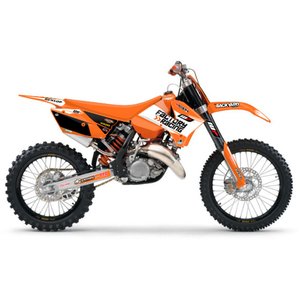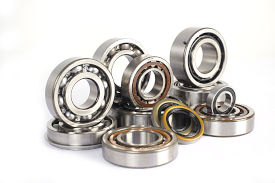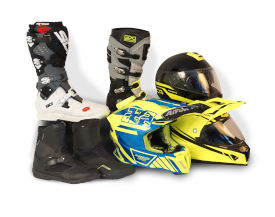KTM 125 SX [2011-2015]: The Lightweight Two-Stroke That Redefined Motocross Agility
Introduction
The KTM 125 SX from 2011 to 2015 represents a golden era for lightweight two-stroke motocross bikes. Designed for riders who crave razor-sharp responsiveness and minimal weight, this Austrian-engineered machine became a benchmark in the 125cc class. While modern four-strokes dominate today's tracks, the 125 SX remains a cult favorite for its raw power delivery, flickable chassis, and pure "old-school" thrill. Let’s dive into what makes this generation of the 125 SX a standout choice for motocross enthusiasts and weekend warriors alike.
Design & Ergonomics: A Purpose-Built Motocross Weapon
KTM’s signature orange-and-black color scheme screams aggression, but the 125 SX’s design goes deeper than aesthetics. The central tube frame made of chrome molybdenum steel tubing provides a rigid yet forgiving foundation, while the 992 mm (39.1-inch) seat height feels surprisingly manageable for a competition bike. Even shorter riders (around 170 cm / 5'7") can plant a foot confidently thanks to the narrow chassis profile.
The cockpit is minimalist and rider-focused. Controls fall naturally to hand, and the 90.8 kg (200.2 lb) dry weight makes the bike feel like an extension of your body mid-air. KTM’s commitment to quality components shines through details like the Excel rims (21-inch front, 19-inch rear) and grippy Dunlop Geomax MX3S tires (80/100-21 front, 100/90-19 rear). Standing up on the pegs feels instinctive, with the footpeg-to-handlebars relationship encouraging an aggressive attack position.
Engine Performance: Two-Stroke Fury, Refined
At the heart of the 125 SX lies a 124.8cc liquid-cooled single-cylinder two-stroke engine producing 35 PS (26 kW). This isn’t just a firecracker—it’s a precision instrument. The Keihin PWK 38S AG carburetor delivers crisp throttle response, while the reed intake and exhaust control ensure a broad powerband for a 125cc two-stroke.
Riding the 125 SX is a masterclass in momentum management. The engine thrives on revs, with a hit that arrives around 8,000 RPM and pulls hard to its 11,500 RPM peak. Clutch work is essential, but the hydraulically operated wet multi-disc clutch offers buttery-smooth modulation. The 6-speed gearbox is a standout, with shifts so precise you’ll forget you’re riding a motocross bike. On tight tracks, short-shifting through gears 2-4 keeps the bike in its sweet spot, while the tall 6th gear allows for deceptively high top speeds on open sections.
Handling & Suspension: WP Magic Meets Austrian Engineering
KTM’s partnership with WP Suspension pays dividends here. The 48 mm USD front fork (300 mm / 11.8 inches of travel) and WP PDS rear shock (317 mm / 12.5 inches travel) strike a perfect balance between plushness and bottoming resistance. Even on choppy whoops, the bike remains composed, while the 26.5° rake angle ensures razor-sharp cornering without headshake at speed.
The 1480 mm (58.3-inch) wheelbase contributes to stability, yet the bike changes direction with telepathic quickness. Braking is equally impressive: the 220 mm front disc with four-piston calipers offers one-finger stopping power, while the rear brake (also 220 mm) is progressive enough for precise slides.
Competition: How the 125 SX Stacks Up
The 125cc motocross class has always been fiercely contested. Here’s how the KTM 125 SX [2011-2015] compares to its rivals:
- Yamaha YZ125: Lighter at 86 kg (189 lbs), but the Yamaha’s engine lacks the KTM’s mid-range punch. The 125 SX’s hydraulic clutch and WP suspension also feel more premium.
- Honda CR125R: Discontinued after 2007, but still a used-market competitor. The Honda’s chassis is plusher, but the KTM dominates in power delivery and parts availability.
- Husqvarna TC125: Shares DNA with the KTM (both under Pierer Mobility Group), but the Husky’s linkage rear suspension appeals to riders who prefer a plusher rear end on hard landings.
Where the 125 SX shines is its power-to-weight ratio and aftermarket support. While the Yamaha and Honda require more frequent top-end rebuilds, the KTM’s Nikasil-coated cylinder and forged piston enhance durability.
Maintenance: Keeping Your 125 SX in Fighting Shape
Two-strokes are simple but demand vigilance. Here’s your MOTOPARTS.store maintenance cheat sheet:
- Top-End Rebuilds: Every 30-40 hours for casual riders. Invest in a Vertex piston kit and Cometic gaskets for reliability.
- Air Filter Care: Clean after every ride. Our Twin Air filter with No Toil oil simplifies maintenance.
- Suspension Service: Rebuild WP forks/shocks annually. Upgrade to SKF seals for longer service intervals.
- Brake Fluid: Flush DOT 4 fluid yearly. Consider Brembo HC brake pads for improved bite.
- Chain & Sprockets: The 520 chain lasts ~50 hours. Pair a DID ERT2 chain with Supersprox stealth sprockets for durability.
Pro Tip: Mix oil at 1:40 ratio (25:1 for break-in). Use Motorex Cross Power 2T for minimal smoke and clean power valves.
Conclusion: A Timeless Motocross Icon
The 2011-2015 KTM 125 SX isn’t just a bike—it’s a rite of passage. Its combination of explosive power, featherweight handling, and bulletproof construction makes it ideal for:
- Riders transitioning from 85cc machines
- Veterans nostalgic for two-stroke thrills
- Anyone seeking an affordable, mod-friendly race bike
While newer fuel-injected models exist, this generation remains a favorite for its mechanical purity and accessibility. At MOTOPARTS.store, we’ve got everything to keep your 125 SX ripping—from performance pipes to grippy footpegs. Now get out there and let that two-stroke scream!
Specifications sheet
| Engine | |
|---|---|
| Stroke: | Two-stroke |
| Max power: | 26 kW | 35.0 hp |
| Fuel system: | Carburettor (Keihin PWK 38S AG) |
| Max power @: | 11500 rpm |
| Displacement: | 125 ccm |
| Configuration: | Single |
| Cooling system: | Liquid |
| Lubrication system: | 2-stroke pre-mix (1:40 ratio) |
| Number of cylinders: | 1 |
| Dimensions | |
|---|---|
| Wheelbase: | 1480 mm (58.3 in) |
| Dry weight: | 91 |
| Seat height: | 992 mm (39.1 in) |
| Ground clearance: | 395 mm (15.6 in) |
| Fuel tank capacity: | 7.5 L (2.0 US gal) |
| Drivetrain | |
|---|---|
| Chain type: | 520 series |
| Final drive: | chain |
| Transmission: | 6-speed |
| Rear sprocket: | 50 |
| Front sprocket: | 13 |
| Maintenance | |
|---|---|
| Coolant: | Water-based coolant (ethylene glycol mix) |
| Brake fluid: | DOT 4/5.1 |
| Spark plugs: | NGK BR8ES (or manufacturer-specified equivalent) |
| Rear tire pressure: | 1.4–1.6 bar (20–23 psi) |
| Front tire pressure: | 1.2–1.4 bar (17–20 psi) |
| 2-stroke oil recommendation: | Fully synthetic 2T oil (1:40 mix ratio) |
| Chassis and Suspension | |
|---|---|
| Frame: | Central tube frame (chrome molybdenum steel) |
| Rear tire: | 100/90-19 |
| Front tire: | 80/100-21 |
| Rear brakes: | Single 220 mm disc, 2-piston caliper |
| Front brakes: | Single 220 mm disc, 4-piston caliper |
| Rear suspension: | WP PDS shock absorber |
| Front suspension: | WP USD 48 mm inverted fork |
| Rear wheel travel: | 330 mm (13.0 in) |
| Front wheel travel: | 300 mm (11.8 in) |
| Additional Specifications | |
|---|---|
| Wheels: | Excel rims (1.60x21" front, 2.15x19" rear) |
| Frame material: | 25CrMo4 chromium-molybdenum steel |
| Starter system: | Kick |
| Ignition system: | Kokusan digital CDI |
| Primary drive ratio: | 23:73 |



















